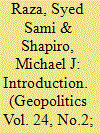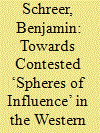|
|
|
Sort Order |
|
|
|
Items / Page
|
|
|
|
|
|
|
| Srl | Item |
| 1 |
ID:
164731


|
|
|
|
|
| Summary/Abstract |
This research focuses on the relationship between the tribe and the state in Pakistan’s Western borderlands and how this relationship has been continuously affected by the security needs of the state. I argue that there is a dialectical relationship between the tribe and the state. Both of them represent an authority structure, institutions, leadership and rules and procedures to govern populations. While the logic of the state and the modern notions of national sovereignty and territorial control would require assimilation of the tribe into the larger national community, the tribe and its chieftain would strive to maintain their autonomy, traditions and time-tested political arrangements that have served their purpose. The ethos and structural needs of the two to survive and develop – for the state to expand and the tribe to resist and maintain its relative autonomy – clash.
|
|
|
|
|
|
|
|
|
|
|
|
|
|
|
|
| 2 |
ID:
164730


|
|
|
|
|
| Summary/Abstract |
This special issue focuses on the Pakistan-Afghanistan borderland. It collects a set of articles that return in different ways to the common theme of “politics on border.” It makes a series of interdisciplinary forays to make the Pakistan-Afghanistan border politically more legible. The borderland is presented from multiple methodological approaches and critical perspectives. It focuses on certain hitherto untouched or least debated dimensions of this border, for instance the status of women in the border-culture, the concept of alienage in the making of border, extensions and manifestations of the border, and political aesthetics of the border.
|
|
|
|
|
|
|
|
|
|
|
|
|
|
|
|
| 3 |
ID:
164733


|
|
|
|
|
| Summary/Abstract |
In the summer of 2011, two incidents of coldblooded violence took place at the hands of law enforcement agencies (LEAs) in Pakistan. One incident involved the killing of a group of foreigners/aliens traveling across the Pakistan–Afghanistan border, and the other involved the killing of a citizen in an area under curfew in the metropolitan city of Karachi. On one hand, the Supreme Court of Pakistan took a Suo Moto action in the case of the latter incident, while remaining silent on the former. On the other, the Pakistani government, instead of reviewing the powers of LEAs, increased them by passing new security laws in the following years. In this article, I focus on these two incidents of violence to question how/why aliens are treated differently from citizens in the Pakistan’s criminal justice system. I trace the legal genealogy of that differential treatment and highlight the different stages of its growth. I also throw light on the way lethal force was used on the victims to show the drawbacks in the operational side of law enforcement. Finally, I engage critical theory to understand the nature of this violence, which now resides in the structure of the legal regime of security.
|
|
|
|
|
|
|
|
|
|
|
|
|
|
|
|
| 4 |
ID:
164739


|
|
|
|
|
| Summary/Abstract |
This article will read the China-Pakistan Economic Corridor (CPEC), whose infrastructure and installations are currently being built across Pakistan, as a moving border-making event which inscribes difference within Pakistan. The article will begin with a discussion of borders and border-making. The discussion will then turn to the different registers of difference that will be created in Pakistan through CPEC. The article will conclude with a speculative look at how Pakistan and the wider region may be impacted once the construction of CPEC is complete.
|
|
|
|
|
|
|
|
|
|
|
|
|
|
|
|
| 5 |
ID:
164732


|
|
|
|
|
| Summary/Abstract |
At the core of this article lies the attempt to consider “radical egalitarianism” a defining feature of “borderscapes”, that is the space in which distinct socio-spatial identities between territorial claims and counter-claims at the margins of larger political entities are negotiated. These more general considerations are exemplified by a genealogical excursion into the dominantly Pashtun-inhabited regions around the Hindukush and its foothills. In a first step, the emergence of distinct ethnicities and religiosities as result of such asymmetrical negotiation processes, which are also strongly informed by the urban-rural divide, is highlighted by a historical recourse into the later seventeenth century. In the two successive steps, then, the further modifications of those ethnicities and religiosities since the late nineteenth century are indicated, painting an image of the “Pashtun borderscape” in which even militant movements like those of the present time can be understood as just a manifestation of such kind of negotiation processes that limit the scope of “us” and “them” ever further. It will be illustrated how an ever changing semantics of “egality”, which nonetheless is construed as entirely static, is established as a core benchmark of belonging.
|
|
|
|
|
|
|
|
|
|
|
|
|
|
|
|
| 6 |
ID:
164737


|
|
|
|
|
| Summary/Abstract |
In this article I read a selection of Pashto literatures against the grain of world history, as critical thought about geopolitics. Drawing on Michael Shapiro’s concept of aesthetic subjects, as well as on border theory, I argue that the authors, the content, and the literary networks of these works all critically comment on global relations of power, ranging from the local bordering effects of geopolitics, to systems of knowledge embedded in the spatiality and temporality of empire. I argue that past and current imperial processes have led to fragmenting effects in Afghan society, and literature both reflects and analyses this. More than that, though, I argue – using the lives of authors as well as their work – that literary activity in Pashto has actively negotiated such processes throughout its recent history, and offers strategies for different notions of global connectivity. The decentralized and multiperspective images of life in these works sit in counterpoint not only to the systems-oriented views that drive military and other policy in Afghanistan during the on-going US moment, but also to universalist perspectives upon which disciplines like world history and geopolitics have traditionally relied. This contributes to the aesthetic turn in IR by arguing that it is not only the aesthetic vision in works that can challenge dominant forms of knowledge: the shape of the Pashto literary formation itself, organic with its contents, is an alternate form of knowledge-in-practice about the contemporary world.
|
|
|
|
|
|
|
|
|
|
|
|
|
|
|
|
| 7 |
ID:
164735


|
|
|
|
|
| Summary/Abstract |
This paper explores the relationship between surveillance, refugee ID cards, population control, and the making of the Afghanistan-Pakistan border in the 2000s and 2010s. The paper uncovers how, in the security-dominated Pakistani state, during the Soviet-Afghan War it was politically expedient to host a large Afghan refugee population in the country and make use of a flexible Afghanistan-Pakistan border, but in the “Global War on Terror” this no longer applies. As geopolitical circumstances change, this paper explores how ID cards for Afghan refugees are tools of surveillance that facilitate refuge and the legal/documentary, social, and physical exclusion of the non-citizen refugee. These forms of exclusion allow the Pakistani state to “perform” the Afghanistan-Pakistan border into effect. The border is not simply located at the territorial frontier but is in process and comes into being through the control over the mobility of citizen and non-citizen populations and forms of social exclusion that are enacted through surveillance and documentation.
|
|
|
|
|
|
|
|
|
|
|
|
|
|
|
|
| 8 |
ID:
164734


|
|
|
|
|
| Summary/Abstract |
This article explores how checkposts, as a practice of everyday bordering, shape individuals’ feelings of ‘ontological security’ in the Pakistani cities of Peshawar, Islamabad and Lahore in a sample of Pakistani middle- and upper-class citizens. In this article, checkposts are treated as urban manifestations of the Afghanistan-Pakistan border, being erected by the Pakistani state in the attempt to reinforce the border in the context of the war on terror. In contrast to the tendency in much of the political science literature to analyse ‘security’ in relation to states and militaries, this article interrogates individuals’ personal experiences of security by drawing on Giddens’ notion of ‘ontological security’. This exemplifies a shift away from quantitative accounts of what it means to ‘be secure’ towards a qualitative account of what it means to ‘feel secure’. The research analyses a series of semi-structured interviews conducted with psychologists, humanitarian workers and peace educators in Pakistan in 2014. Linking my participants’ narratives to an account of ‘ontological security’, I argue that bordering at checkposts diminishes feelings of security, even among citizens who seem not to be the prime suspects and target of checkposts.
|
|
|
|
|
|
|
|
|
|
|
|
|
|
|
|
| 9 |
ID:
164740


|
|
|
|
|
| Summary/Abstract |
The evolution of US-Sino great power competition in East Asia has emerged as a key geostrategic issue in international politics. A central question is whether the ‘geography of the peace’ will prevail where, despite their natural predisposition to compete for regional hegemony, the two great powers respect each other’s ‘spheres of influence’. This concept assumes that, as a major continental power, China remains preoccupied with securing its land borders and expanding its influence on the Eurasian land mass. In contrast, this article argues that the Sino-US rivalry likely leads to the emergence of a ‘geography of conflict’ in East Asia because of overlapping zones of strategic interests. Applying a classical geopolitics approach, it shows that the geopolitical models of British geographer Sir Halford Mackinder, US naval strategist Alfred Thayer and Dutch-American geostrategist Nicholas Spykman are useful to explain the current behaviour of China and the United States, and why, as a result, East Asia is becoming more contested.
|
|
|
|
|
|
|
|
|
|
|
|
|
|
|
|
| 10 |
ID:
164736


|
|
|
|
|
| Summary/Abstract |
This paper explores the cultural status of tribal women living in the Pakistan–Afghanistan borderland. Pakhtun tribes, a patriarchal and paternalistic society, practising tribal customs (Riwaj/Dastoor), inhabit this borderland. Owing to these tribal customs, the tribal Pakhtun society treats women much like property of their men. This essay focuses on how a tribal woman is socially discriminated by denying her certain fundamental rights. I discuss six tribal customs, by giving examples based on my field work, through which tribal women are treated as personal property by her male kin—father, brother, uncle or husband. These customs include shamilaat (denial of the right to inheritance in shared family’s and tribe’s property), miratah (declaring a woman as issueless in the absence of a male kin and thereby denying her property), rasnama/valver/khawara (bride-money), ghairat/nang (honour and pride), badala/swara (barter, as in getting father or brother a bride or as in exchange for settlement of dispute) and ghag (pronouncing the desire to marry a specific woman or in some cases to spite a family).
|
|
|
|
|
|
|
|
|
|
|
|
|
|
|
|
| 11 |
ID:
164738


|
|
|
|
|
| Summary/Abstract |
Inscribing names into the firmament of symbolic orders is crucial argues Rancière who traces the symbolic distribution of bodies into those that ‘one sees’ and those that ‘one does not see’. The issue of accounted visibility-cum-audibility does not only lie within the specific conflict configuration but also within the geopolitical dynamics of the ‘border’ as well as ‘body-borders’ within individuals and communities concerned. One such case can be found at the borderlands of Pakistan with Afghanistan, of the trans-local post-9/11 ‘Wars on Terror’ as well as at the borderlands of Pakistan itself, subjected to invisibility and rumbling noises of conflict and displacement through hegemonic centring of discourses and exclusionary, violent practices of the ‘Wars on Terror’. This article is a collaborative work on experiences of conflict-induced displacement, political violence and narratives of everyday life negotiations thereof, based on field research and interviews (individual as well as group ones) conducted in Khyber Pakhtunkhwa and around the capital of Islamabad with those internally displaced from North Waziristan, South Waziristan and Kurram Agencies. The aim is to juxtapose vociferous and deliberate hegemonic practices of invisibility and de-solidarisation in public discourses and counter-insurgency interventions vis-a-vis certain marginalised communities and citizens with the latter’s own narratives about their experiences and understandings of state-society relations, relevant stakeholders,
|
|
|
|
|
|
|
|
|
|
|
|
|
|
|
|
|
|
|
|
|